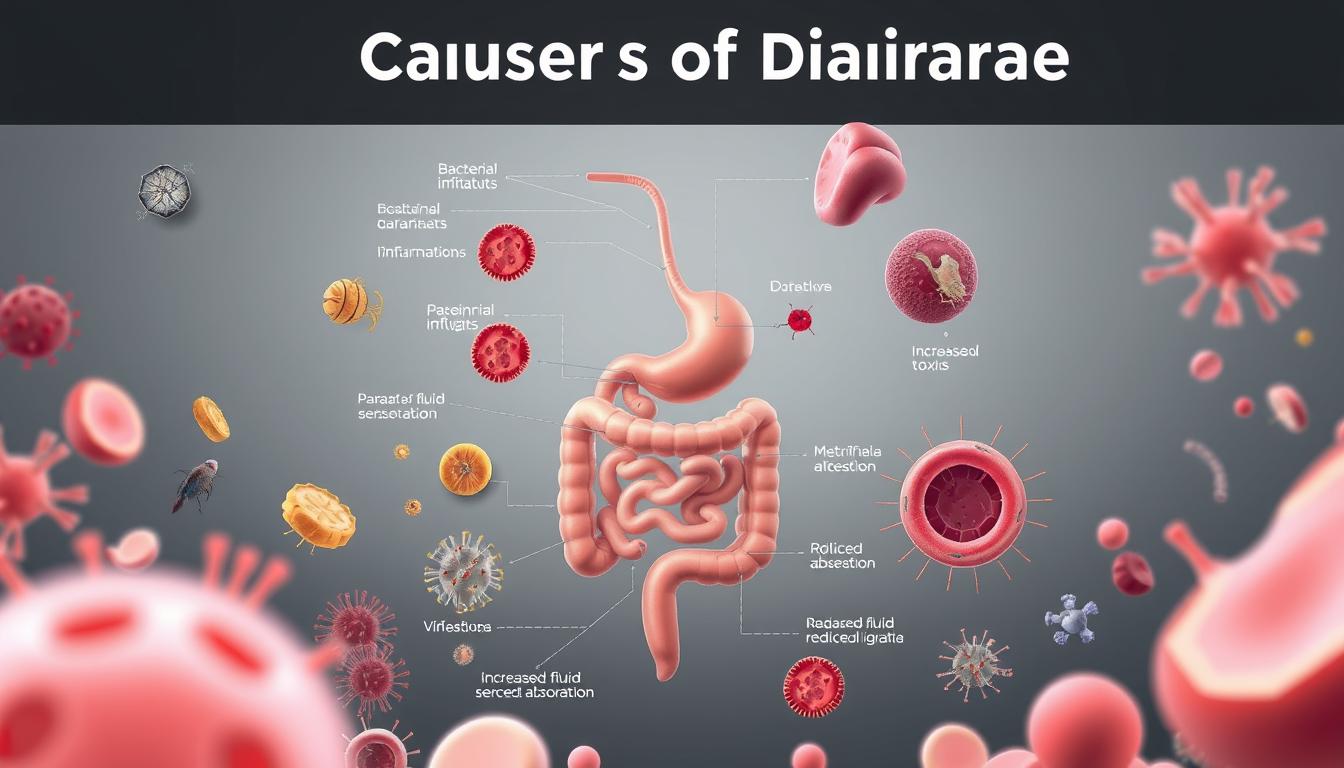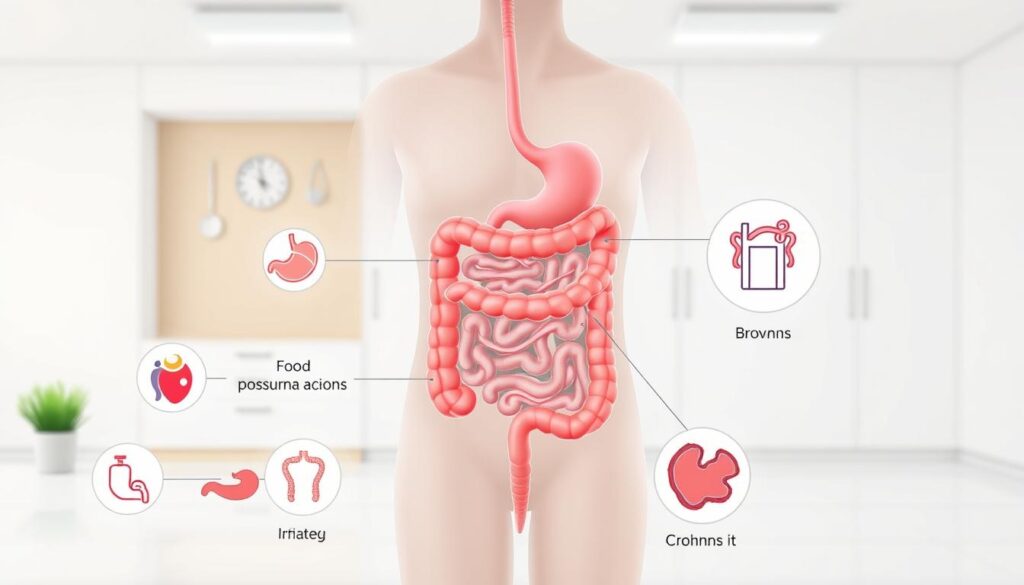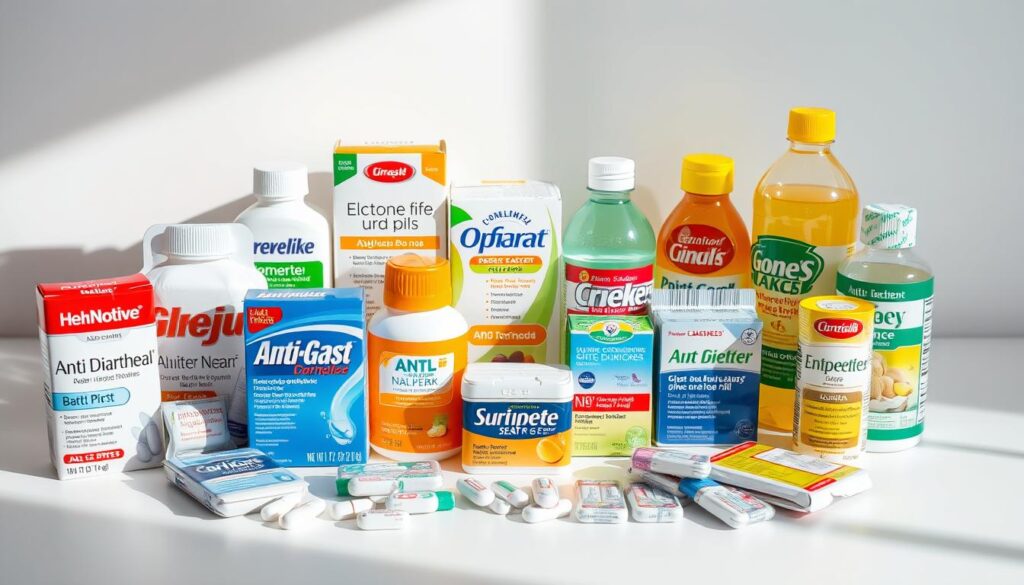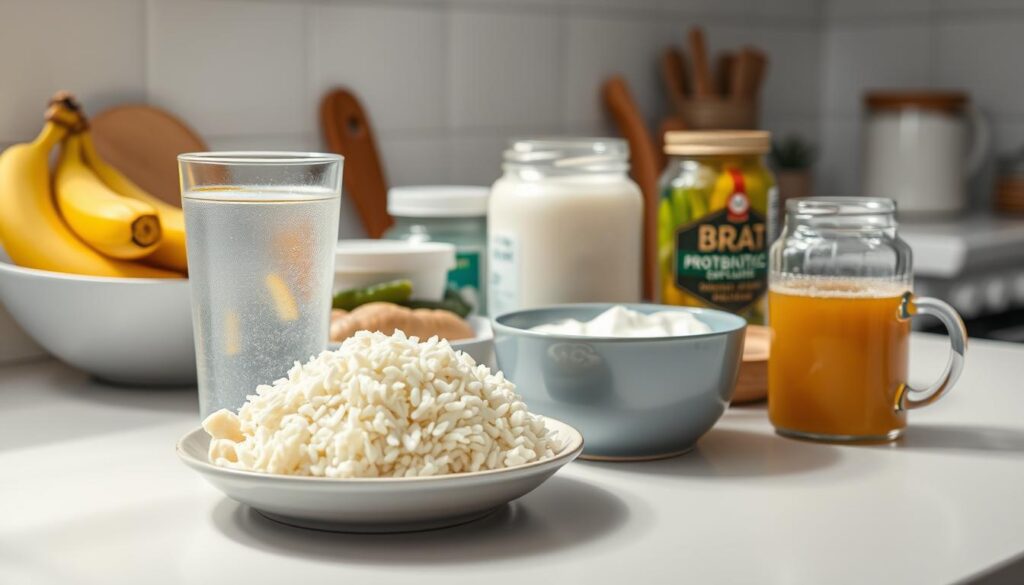Why Do I Have Diarrhea? Causes and Solutions

You wake up in the middle of the night with a rumble in your stomach. Your body tells you to rush to the bathroom fast. If this happens to you, you’re not alone. Millions of Americans deal with this every year, messing up their plans.
Diarrhea happens when you least expect it. Your body usually digests food well, but sometimes it doesn’t. The Cleveland Clinic says it affects people of all ages, from kids to seniors.
Most diarrhea goes away in two to three days. Your body usually gets back to normal without needing a doctor. Knowing why you have diarrhea helps you feel better and stop it from happening again.
Some people go to the bathroom a lot because of irritable bowel syndrome or other long-term issues. Others get diarrhea suddenly after eating certain foods or getting sick. Knowing what makes you sick helps you find the right treatment.
Key Takeaways
- Diarrhea involves loose, watery stools that disrupt normal bowel movements
- Most episodes resolve within 2-3 days without medical intervention
- Common triggers include infections, dietary choices, and certain medications
- Chronic conditions like IBS can cause recurring diarrhea episodes
- Proper hydration remains key during any diarrhea
- Knowing your triggers helps prevent future diarrhea
Understanding Diarrhea: Definition and Types
Diarrhea affects millions each year. Knowing its types helps you know when to get help. It comes in different forms, each with its own cause and severity.
What is Diarrhea?
Diarrhea means your body makes loose, watery stools more often. You might feel urgent to go, have cramps, and feel sick to your stomach. Losing water and minerals is a big problem.
Acute vs. Chronic Diarrhea
Acute diarrhea lasts a few days and often goes away by itself. It’s usually from viruses or bad food. But, if diarrhea lasts two to four weeks, you need to see a doctor.
Chronic diarrhea lasts over a month or keeps coming back. It might mean you have a bigger health issue. Seeing a doctor is key to figuring out what’s wrong and how to fix it.
Causes of Diarrhea
Many things can make your stomach upset:
- Viral infections like norovirus or rotavirus
- Bacterial contamination from E. coli or Salmonella
- Parasitic infections from contaminated water
- Food intolerances or allergies
- Medications, like antibiotics
- Digestive disorders including Crohn’s disease
Knowing what causes diarrhea helps you avoid it. It’s good for your stomach health.
Common Causes of Diarrhea
Diarrhea in adults is often a sign of something wrong in the body. Knowing what causes it can help you find a solution. Common reasons include infections, what you eat, and some medicines.
Viral Infections
Viruses like norovirus often cause diarrhea. They spread quickly through food, water, or surfaces. Rotavirus mainly hits kids but can also affect adults. COVID-19 can also lead to diarrhea.
Other viruses like astrovirus, cytomegalovirus, and hepatitis viruses can also cause it.

Bacterial Infections
Bacteria in food or water can cause diarrhea. Escherichia coli (E. coli) is a big offender. Clostridioides difficile (C. diff) often comes after antibiotics mess with your gut.
Parasites like Giardia can get in through bad water, often when traveling.
Dietary Factors
Your diet is key to your digestive health. Some foods can trigger diarrhea. These include:
- Lactose intolerance from dairy
- Fructose sensitivity from fruits and sweeteners
- Artificial sweeteners like sorbitol and erythritol
- Spicy or fatty foods
Medications
Some medicines can cause diarrhea. Antibiotics can upset your gut’s balance. Cancer drugs and antacids with magnesium can also make you have loose stools.
| Medication Type | How It Causes Diarrhea | Common Examples |
|---|---|---|
| Antibiotics | Disrupts gut bacteria | Amoxicillin, Clindamycin |
| Antacids | Magnesium draws water into intestines | Milk of Magnesia, Maalox |
| Chemotherapy | Damages intestinal lining | 5-Fluorouracil, Irinotecan |
Recognizing Symptoms of Diarrhea
Knowing the signs of diarrhea is key to treating it right. If you have loose stools sometimes, it’s okay. But, if it happens a lot, you need to act fast. This helps you find the best ways to stop diarrhea and when to see a doctor.
Frequency and Consistency
Diarrhea means you go to the bathroom three or more times in 24 hours. Your stools are loose or watery. You might feel like you need to go right away.
The stools can be slightly loose or very liquid. You might feel a strong urge to go to the bathroom.
Accompanying Symptoms
Diarrhea can also bring other symptoms:
- Abdominal cramps and pain
- Bloating and gas
- Nausea or vomiting
- Fever above 100°F
- Blood or mucus in stool
- Loss of bowel control
When to Seek Medical Attention
Some symptoms need a doctor right away:
| Adults | Children |
|---|---|
| Diarrhea lasting over 2 days | No improvement within 24 hours |
| Signs of dehydration | Dry mouth or no tears when crying |
| Severe abdominal pain | Unusual drowsiness or irritability |
| Black or bloody stools | Fever above 101°F |
| Fever exceeding 101°F | Blood in stool |
How to Diagnose Diarrhea
If you have diarrhea that won’t go away or is very bad, you need to see a doctor. They will find out why you have diarrhea and what to do next. This is the first step to feeling better.
Medical History Review
Your doctor will ask you lots of questions. They want to know when your diarrhea started and how often it happens. They also ask about your diet, any new medicines, and if you’ve traveled recently. This helps them find the cause.
Physical Examination
Your doctor will check for dehydration by looking at your skin and mouth. They will also press on your belly to see if it hurts. They check your blood pressure and heart rate too. These checks help them understand how serious your condition is.

Diagnostic Tests
If your symptoms don’t get better, your doctor might do some tests. They might take a stool sample to look for bacteria or parasites. Blood tests can show infections or inflammation. For long-term cases, they might do:
- Colonoscopy to look at your colon
- Hydrogen breath tests for lactose intolerance
- Imaging tests for organ problems
- Fasting tests for food sensitivities
These tests help find the exact cause. This way, you get the right treatment for your diarrhea.
Home Remedies for Diarrhea
Simple remedies at home can help when you have an upset stomach. Start by addressing fluid loss and choosing the right foods. These steps are good for mild cases and can make you feel better in a day or two.
Hydration Strategies
Dehydration is a big risk with diarrhea. Drink at least six 8-ounce glasses of fluid each day. The best choices are:
- Electrolyte replacement drinks like Pedialyte
- Caffeine-free sodas (let them go flat first)
- Fat-free chicken or vegetable broth
- Tea sweetened with honey
- Sports drinks such as Gatorade
Drink fluids between meals, not during eating. This helps your digestive system better.
Foods to Eat
The BRAT diet is a trusted treatment for diarrhea. It includes bananas, rice, applesauce, and toast. These foods are easy on your stomach. You can also try:
- Plain baked potatoes
- Plain noodles or pasta
- Lean beef or fish
- Skinless chicken or turkey
Foods to Avoid
Some foods can make symptoms worse. Avoid caffeine in coffee and chocolate. Alcohol also irritates your stomach. Foods like beans, cabbage, and Brussels sprouts can cause gas.
Don’t eat dairy products because you might get lactose intolerance. Fizzy drinks and beer can also cause gas and cramping.
Over-the-Counter Treatments
When you have an upset stomach, you can find help at your local pharmacy. These medicines work in different ways to ease your symptoms fast. For mild cases, they can help when you need it most.

Loperamide (Imodium)
Loperamide slows down your gut, letting your intestines absorb more fluid. You can take it as tablets or liquid. Adults start with 4mg, then 2mg after each loose stool.
Don’t take more than 16mg a day. It’s best for short-term relief. But, it’s not good if you have bloody stools or fever.
Bismuth Subsalicylate (Pepto-Bismol)
This pink liquid coats your stomach, reducing inflammation. Take 30ml every 30-60 minutes as needed, up to 8 doses daily. It might turn your tongue and stools black temporarily.
This is normal. But, avoid it if you’re allergic to aspirin or taking blood thinners.
Probiotics
Probiotics add good bacteria to your gut. Look for Lactobacillus or Saccharomyces boulardii. They work slowly, taking days to show results.
You can find them as capsules, powders, or yogurt drinks. Take them with food for better absorption. Keep using them for at least a week after symptoms get better.
When to Consult a Doctor
Most adults with diarrhea get better in a few days without seeing a doctor. But, some signs mean you need to go to the hospital fast to avoid big problems.
Severe Symptoms
Go to the emergency room if you see blood in your stool or black, tarry stools. These signs could mean you’re bleeding inside or have a serious gut problem. A fever over 101°F that lasts more than 24 hours with diarrhea is also a big warning sign.
Look out for dehydration signs, like:
- Dark-colored urine or less urine
- Rapid heartbeat
- Dry skin and mouth
- Dizziness or confusion
- Severe headaches
Underlying Health Conditions
If you have health issues like inflammatory bowel disease, diabetes, or a weak immune system, see your doctor right away when you get diarrhea. Cancer patients or those who’ve just finished treatment should tell their doctor about any diarrhea too.
Persistent Diarrhea
If you have diarrhea for more than two days and you’re healthy, you should see a doctor. Long-lasting diarrhea might mean you have an infection, food allergy, or digestive problem that needs treatment. Severe belly pain, constant nausea, or vomiting that makes it hard to keep fluids down are also reasons to go to the hospital fast.
Remember: Getting medical help early can stop bigger problems and find out what’s causing your symptoms.
Dietary Adjustments During Diarrhea
When you have diarrhea, what you eat and drink is very important. Choosing the right foods can help make your stools firmer and prevent dehydration. These simple steps can help you heal faster and feel better sooner.
BRAT Diet Explained
The BRAT diet includes Bananas, Rice, Applesauce, and Toast. These foods are easy on your stomach and help make your stools firmer. Bananas give you potassium, white rice absorbs water, applesauce has pectin, and plain toast is easy to digest.

Importance of Electrolytes
Diarrhea makes you lose important minerals like sodium and potassium. It’s key to replace these to avoid weakness and dehydration. Good choices include:
- Sports drinks like Gatorade or Powerade
- Fat-free chicken broth
- Honey-sweetened tea
- Coconut water
Drink small amounts often instead of drinking a lot at once. This helps your body absorb fluids better.
Reintroducing Foods Gradually
When you start feeling better, slowly add regular foods back into your diet. Start with simple proteins like boiled chicken or scrambled eggs. Avoid dairy, fatty foods, and high-fiber items until you’re fully recovered. Remember foods that make you feel bad and avoid them for now.
Managing Diarrhea in Children
Diarrhea in kids worries any parent. Kids lose fluids fast because their bodies are small. Knowing why and how to help can ease their discomfort.
Typical Causes in Children
Diarrhea often comes from viruses, like rotavirus. This virus causes sudden, watery stools. Bacterial infections, food sensitivities, and new foods or formulas also cause it.
Young kids, who love to explore by mouth, get sick more easily. This is because they touch many germs.
Treatment Options
When kids have diarrhea, we focus on keeping them hydrated. Give them small amounts of clear fluids like water or special electrolyte solutions. Don’t give them sugary drinks or fruit juices.
Keep breastfeeding if your baby is nursing. For older kids, start with bland foods like rice, bananas, and toast when they’re ready.
Monitoring Hydration
Look out for signs that mean you need to see a doctor right away:
- No wet diaper for three or more hours
- Dry mouth and tongue
- Fever above 102°F (39°C)
- Crying without producing tears
- Unusual drowsiness or irritability
- Sunken eyes, cheeks, or soft spot on baby’s head
If your child’s diarrhea lasts more than 24 hours or if you see any of these signs, call your pediatrician. Quick action helps your child get better faster.
Lifestyle Modifications to Prevent Diarrhea
Simple daily habits can protect you from many causes of diarrhea. By making small changes, you can lower your risk of getting sick. These changes help stop germs and keep food safe.
Handwashing Practices
Your hands touch many surfaces every day, picking up germs. Washing your hands is the best way to prevent diarrhea. Use soap and warm water for at least 20 seconds.
Make sure to wash your hands:
- Before and after preparing food
- After handling raw meat or eggs
- After using the bathroom
- After changing diapers
- After sneezing, coughing, or blowing your nose
If you can’t wash your hands, use hand sanitizer with at least 60% alcohol. Rub it all over your hands until they’re dry.
Safe Food Handling
Food poisoning is a big cause of diarrhea. Keep your kitchen clean and follow safety rules. Store perishable foods in the fridge within two hours.
Cook meats to safe temperatures – 165°F for poultry and 160°F for ground beef. Wash cutting boards and utensils after each use, after raw meat.
Travel-Related Precautions
Traveling can expose you to new bacteria. For diarrhea prevention while traveling, drink only bottled or boiled water. Use bottled water for brushing teeth too.
Avoid raw fruits and vegetables unless you peel them yourself. Choose hot, freshly cooked foods over cold ones. Don’t eat ice cubes, unpasteurized dairy, or street food. The Centers for Disease Control has health warnings for places you might visit.
Diarrhea and Gut Health
Your gut has trillions of bacteria that help your digestive system work well. When this balance is upset, you might get chronic diarrhea. Knowing how your gut bacteria work can help prevent diarrhea.
The Role of Gut Flora
Your intestines have good and bad bacteria. The good bacteria digest food, make vitamins, and fight off bad germs. When they’re in balance, your digestion is fine. But an imbalance can cause problems like chronic diarrhea.
Impact of Antibiotics
Antibiotics are great at fighting infections. But they can’t tell the good bacteria from the bad. This means they kill off both, leaving your gut open to harm. You might see:
- Disrupted intestinal balance
- Increased risk of Clostridioides difficile infections
- Temporary or prolonged diarrhea
Strategies to Restore Balance
To fix your gut health and prevent diarrhea, try these steps:
- Take probiotics with Lactobacillus and Bifidobacterium strains
- Eat fermented foods like yogurt, kefir, and sauerkraut
- Add prebiotic-rich foods like bananas and oats to your diet
- Drink plenty of water to help your digestion
Many things can cause chronic diarrhea, like irritable bowel syndrome or celiac disease. If you have ongoing diarrhea, see a doctor for help.
Long-Term Solutions and Prevention
Managing chronic diarrhea needs a proactive health approach. If symptoms last more than four weeks, you need a detailed plan. Your doctor will ask about your symptoms, stool, weight, and food triggers.
This info helps find the root cause, like irritable bowel syndrome or inflammatory bowel disease.
Regular Check-Ups
See your healthcare provider regularly to check your digestive health. These visits help catch problems early. Your doctor can adjust your treatment as your symptoms change.
Stay current with vaccines like rotavirus and COVID-19 to prevent infections that cause diarrhea.
Maintaining a Balanced Diet
Eating right is key to preventing diarrhea. Eat foods that help your digestive system and avoid your triggers. Include fiber, lean proteins, and probiotics like yogurt or kefir.
Drink lots of water to stay hydrated. If certain foods upset you, don’t eat them.
Keeping a Food Diary
Keep a food diary to track your diet and symptoms. Write down all you eat and drink, and any symptoms that follow. This diary shows patterns between food and digestive issues.
Share it with your doctor to create a long-term plan for managing chronic diarrhea.
